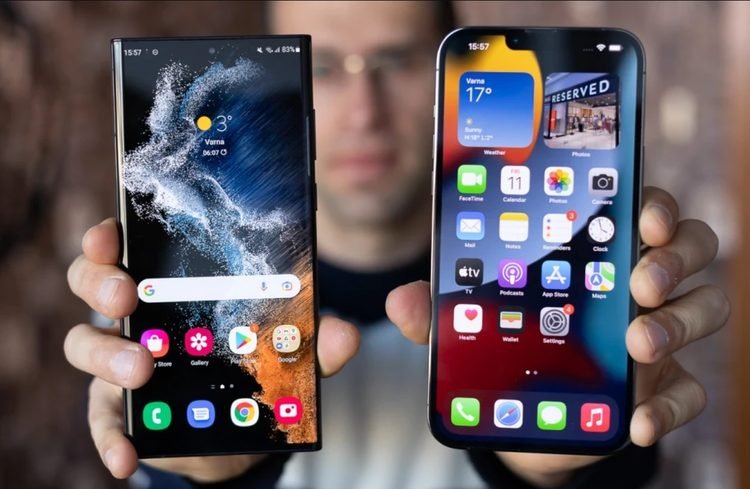The never-ending Apple vs Android debate continues to captivate tech enthusiasts worldwide, and Nigeria’s young and tech-savvy population is no exception. A recent statistics shows the number of iPhone and android users in the country. However, iPhone remains the most popular single cell phone in the world with about 1.5 billion active users as of 2023.
In this in-depth article, we will explore the ongoing battle between Apple and Android, focusing specifically on the Nigerian perspective. We will delve into the strengths, weaknesses, user preferences, and factors that contribute to the supremacy of these operating systems in Nigeria.
Apple vs Android: The Apple Experience – Seamlessly Integrated Hardware and Software
Apple’s iOS has garnered an ardent following due to its seamless integration of hardware and software. The company’s unwavering commitment to delivering a premium user experience resonates with Nigerian gadget users. The iPhone, with its sleek design, premium build quality, and intuitive interface, has become a status symbol among tech enthusiasts in Nigeria
For instance, numerous reliable sources within the Apple community have suggested that Dynamic Island, Apple’s interactive notch replacement, is expected to be included in all four models of the upcoming iPhone 15. This would mark a significant development, considering that Dynamic Island is currently limited to the higher-priced iPhone 14 Pro and iPhone 14 Pro Max variants Apple’s closed ecosystem ensures optimized performance and robust security, providing users with a consistent experience across all their devices.
The Appeal of Android – Versatility and Customization
Android, the open-source operating system developed by Google, offers a diverse range of devices and a more customizable experience. This adaptability has struck a chord with Nigerian users who prefer to personalize their smartphones. Renowned brands like Samsung, Infinix, and Tecno provide a wide array of Android devices that cater to various budgets and preferences, making them accessible to a broader demographic. Android’s open ecosystem empowers users to tailor their devices according to their preferences.
Section 3: App Ecosystem and Accessibility – Quality vs. Quantity
The app ecosystem is a critical aspect of any operating system, and both iOS and Android offer unique advantages. Apple’s App Store boasts strict quality control, ensuring a curated selection of apps that meet high standards. Nigerian users benefit from a secure and reliable app ecosystem, mitigating the risk of encountering malicious software. However, this curated approach may limit the diversity of available apps.

On the other hand, the Google Play Store provides a vast array of applications, encompassing globally recognized as well as locally developed ones. This diverse selection caters to the varied needs and preferences of Nigerian users. The open nature of Android encourages developers to innovate, resulting in a larger quantity of apps available for download. Nigerian users enjoy a broader range of options, including region-specific applications and services.
Affordability and Market Share – Widening the Reach
In a price-conscious market like Nigeria, affordability significantly influences consumers’ decisions. Android devices gain a considerable advantage in Nigeria due to their competitive pricing and wider availability across different price points which allows users to have a wide varieties to choose from. Consequently, Android’s market share surpasses that of Apple, making it the dominant operating system in the country and accessible to a larger portion of the population.
Apple, with its premium pricing, traditionally appeals to a more niche segment of the Nigerian market. However, the company has taken steps to expand its reach by introducing more affordable options and trade-in programs. Nevertheless, Android’s affordability remains a decisive factor in its widespread adoption in Nigeria.
Localization and Support – Addressing Nigerian Needs
For an operating system to reign supreme in Nigeria, localization and support are vital considerations. Android, being an open ecosystem, has an advantage in this area. It offers robust support for local languages, enabling Nigerian users to communicate and interact with their devices seamlessly. Additionally, Android devices come preloaded with Nigerian-specific apps and services, catering to the unique needs of Nigerian users.
Apple has faced challenges in terms of localization and regional support. However, the company has made significant strides in recent years, introducing Nigerian-specific apps, offering language support, and partnering with local service providers. While Apple continues to expand its services in Nigeria, Android’s early lead in addressing Nigerian users’ needs is apparent.
The Apple vs. Android debate in Nigeria is a dynamic and multifaceted phenomenon. While Apple’s iOS delivers a premium user experience, renowned for its integration of hardware and software, Android’s versatility, customization options, affordability, and larger market share have cemented its dominance in Nigeria. Ultimately, the choice between Apple and Android depends on individual preferences, priorities, and budget considerations.
Nigerian gadget users have benefitted from the fierce competition between Apple and Android, as both companies continuously innovate to improve their offerings. This rivalry has led to advancements in smartphone technology, enhanced user experiences, and a wider range of choices for Nigerian consumers.
In conclusion, the supremacy of an operating system in Nigeria is determined not only by its technical capabilities but also by its ability to adapt to the local context, provide affordable options, and cater to the diverse needs of Nigerian gadget users.


